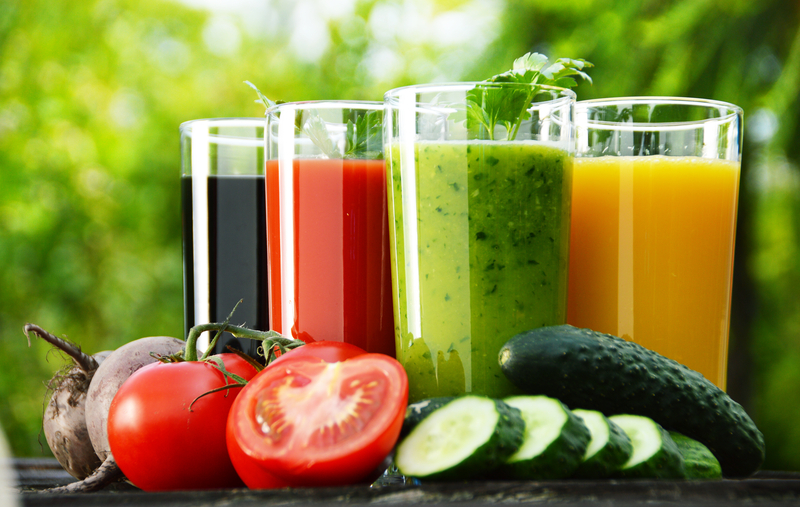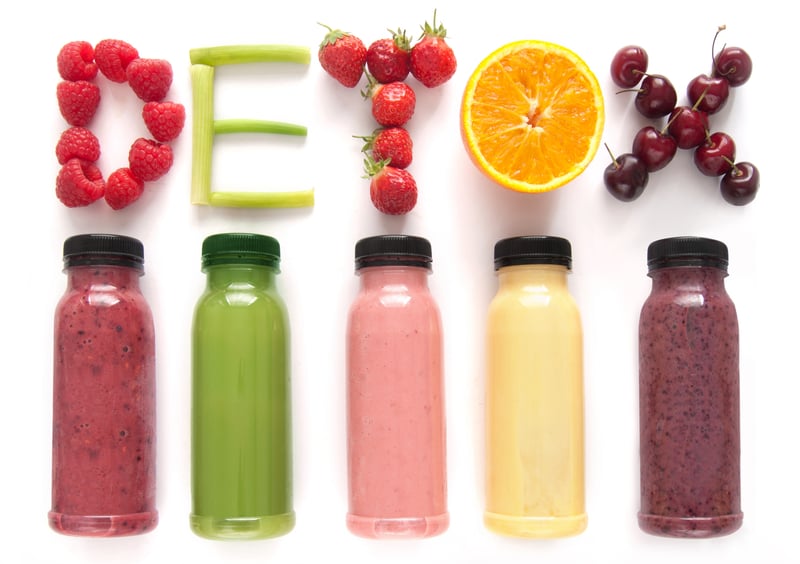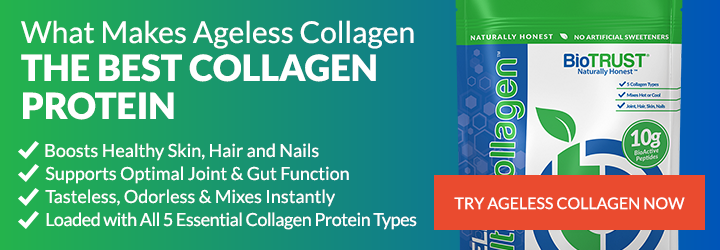Why Most Detox Diets and Cleanses Don’t Work (At All)

Glowing skin. Beat the bloat. Lose weight fast. Unlimited energy…If you’ve come across claims like these, they probably come attached to a cleanse or detox program of some sort. Just drink this detox concoction, take this cleansing pill, or try one of the popular detox diets, and BOOM, all of your health woos will vanish. You’ll feel lighter, healthier, and more vibrant after your cleanse.
Especially at the beginning of the year (and certain seasons), detox diets and cleanses become the hottest trend to get back in shape fast. They often claim to help rid you of toxins and provide a much-needed break to your digestive system and detox organs, leaving you feeling younger and healthier.
Unfortunately, as with so many too-good-to-be-true claims, typical detox diets and cleanses—often from drinking some detox tea, juice, or other “healthy” concoction—not only DON’T live up to the hype, they can be dangerous and lead to worse problems than you started with.
What are Detox Diets?
Like many of the common buzzwords in health and fitness, the words “detox” and “cleanse” lack a universal definition. However, they do typically have one thing in common: they’re based on restriction. That is, when following these types of diets, certain foods, food groups, or even all food is deemed unacceptable for a period of time to help “eliminate” toxins from the body that have built up, due to dietary choices, lifestyle, and environmental exposure.
Many also add in some special foods, teas, juices, etc., to help increase elimination. Proponents proclaim that once the influx of toxins is removed and the excretion increased, you’ll feel healthier, lighter, and lose weight within days.
Common detoxes typically come in three varieties:
- Those that replace foods with drinks (e.g., green drinks, lemon juice, apple cider vinegar concoction)
- Those that provide supplements or herbs “designed to support your body’s detox processes” (e.g., liver support supplements)
- Those that clear out the colon and digestive track (i.e., help you poop).
All of them tend to encourage drinking more fluids to help flush out toxins combined with fasting or drastically cutting food intake.
Detox diets and supplements differ from each other. Most, however, have little, if any, scientific backing to support their claims. In fact, according to the National Center for Complementary and Integrative Health, a 2015 review found “no compelling research to support the use of ‘detox’ diets for weight management or eliminating toxins from the body.” Another 2017 review found that while detox diets can lead to initial weight loss due to decreased calories, they then lead to weight gain once a person returns to a normal diet. 1

3 Common Detoxes That Don’t Work
1. The Juice Cleanse
Liquid-only detoxes are some of the most popular. You “rest” your digestive system by replacing solid foods with fruit- and vegetable-based juices or smoothies for somewhere between 3 and 21 days. (Some even go longer.) You can even buy the juices pre-made.
On their own, the juices and smoothies may be highly nutritious—especially if you are finally consuming more fruits and vegetables and increasing the nutrient-density of your diet. The problem, however, comes from forgoing all other food. One of the biggest drawbacks is depriving the body of protein and fat. This can lead to increased hunger levels as well as erratic blood sugar levels, fatigue, lethargy, brain fog, and decreased productivity. It’s just hard to concentrate when you’re hungry all the time.
2. Detoxing the Liver
If you’ve perhaps overindulged over the holidays (or due to social isolation from COVID-19—join the club), then you may be wondering how healthy your liver is. The goal of a liver detox is to promote healthy liver function, so it is better able to handle the toxins coming in.
You don’t, however, need a cleanse to do so. All you need to do is reduce the burden on your liver (i.e., decrease the amount of toxins you’re consuming) and ensure your diet is nutrient-dense. That is, fill up on vegetables and fruits, increase fiber from beans, nuts, and grains, and yes, and cut back on the alcohol (to no more than one per day for women or two per day for men)—or better yet, eliminate it altogether for a while. For example, give up drinking completely for a full month.
3. Elimination Diets
Elimination diets are often used for people to determine if they have any food allergies or intolerances—especially those who have been suffering from unexplained health issues. These types of detox diets typically drop all grains, eggs, dairy, nuts, and other high-allergen foods to “clear out” the body before adding back foods one at a time to see if there’s a reaction.
These types of diets are difficult and highly restrictive and can take a while to work through. In addition, they’re often only recommended to be used under the guidance of a qualified nutritionist, who can help guide the way. And in the end, you may still not discover the true culprit that’s causing your discomfort or ailments.
An easier, and potentially more effective option, is to just cut out one food at a time to see if you feel better. If symptoms like bloating, gas, skin issues, or intestinal discomfort disappear after, say, you stop eating eggs for a week or two, only to re-appear once you reintroduce them, you’ll know what food actually needs to be removed from your diet.
While some cleanses recommend an elimination diet, it probably just isn’t necessary and won’t have any positive impact on your overall health. And again, because elimination diets can also lead to nutrient deficiencies, they’re only recommended under the care of a qualified healthcare practitioner or nutritionist.
Detoxing: A Natural Process
While one type of detox or another may sound enticing, for many people, they’re simply not needed. Our bodies have a built-in detox program, and as long as you don’t push the limits, your body can and will naturally detox. It even has organs devoted to the processes (e.g., the liver, kidneys, lungs, GI tract, and even skin), which clear out and prevent the accumulation of toxins, chemicals, hormone derivatives, and waste.
For instance, the liver filters out toxic substances found in food and drink to prevent them from reaching the bloodstream. The kidneys continually filter the blood and remove toxins through the urine. The colon, part of the gastrointestinal tract, is also part of the detox system, which is why it’s so important to feed the good bacteria in the gut and keep bowel movements regular. The lungs are also vital to eliminating the toxins from the air we breathe. The body is always cleansing, and when the detox systems are working well, we feel fit, healthy, and energetic.
If you don’t feel well, does that mean it’s time for a detox diet? Often, they simply aren’t necessary. Some can even end up doing more harm than good. For example, detox diets may:
- Lead to diarrhea. No, this isn’t a sign of “flushing out the toxins.” Diarrhea removes fluid, stored vitamins and minerals, and beneficial bacteria needed to keep the gut healthy. (It’s never a good sign.)
- Cause extreme hunger and exhaustion. Many detoxes drop calories to under 500 per day, making exercise and activity much more difficult.
- Lead to fast weight regain. Not only that, they may even result in more weight gain than was lost once you return to eating “normally.” The drastic dietary changes can upset the metabolism and cause you to lose water and lean mass, making future weight loss (or maintenance) even more difficult.
Sometimes there are issues with the body’s detoxification processes and pathways, and the organs don’t function as they should. If that is the case, then it may be worth looking into any potential underlying medical issues with a healthcare professional instead of jumping right into one of the highly restrictive detox diets.
It’s also possible to overburden the system with poor lifestyle choices, such as a junk-filled diet rife with processed foods, prolonged exposure to environmental pollutants, and the like, leading to decreased levels of energy or just not feeling well.
Rather than seeking a highly restrictive detox diet, you may be able to get everything back into balance simply by eating cleaner, more nutritious foods (such as a rainbow of vegetables and fruits as well as more quality proteins and healthy fats) and moving your body more. You’ll also want to ensure you drink plenty of water to help the increased fiber in your diet do its job and shuttle out the bad stuff.
In other words, you will likely reach and sustain your goals by simply eating more healthfully and exercising—no detox needed.
In addition, it’s important to decrease the toxic load by avoiding highly processed foods, excess sugars, alcoholic drinks, cigarettes, or unnecessary (or recreational) drugs to help the body naturally detox.
These two steps alone will likely make detoxes unnecessary as you’ll begin to develop a long-term, balanced approach to healthy living that’s sustainable and feels good.
Pros and Cons of Detoxing
When people do choose to go on a highly restrictive, elimination-type diet or detox, they can lose weight very quickly. That weight, however, is often water weight along with loss of glycogen (i.e., stored carbohydrate) and lean muscle. And because the diet is so strict and calories are dropped so steeply, many people find they also lose energy, and once the diet ends, they are more likely to gain even more fat.
Detoxes may also result in nutritional deficiencies due to the decreased variety and amount of food allowed. In addition, some people may experience increased stress and thus elevated stress hormones due to severe restriction, hunger, and resisting temptation. 2,3
Detoxes are, thankfully, supposed to be only short-lived. Yet, your goal shouldn’t be to only be healthy or lean for a short period of time. It should be to develop the habits to live long and prosper, which takes a long-term mentality along with lasting dietary and exercise changes.
What about the folks who claim to feel great during or after a cleanse—more energetic and clearer-minded, for example? These benefits are likely less about the cleanse and more likely due to the elimination of processed foods, excess alcohol, and other lifestyle choices that can weigh people down.
That said, there are some potential benefits of detoxing, including:
- Decreasing exposure to toxins and processed foods
- Losing weight
- Increasing consumption of healthy, nutrient-dense whole foods (e.g., vegetables and fruits)
- Drinking more water and teas
- Drinking no alcohol or sugar-loaded sodas
- Increasing mindfulness
- Improving rest and sleep hygiene
These can be very beneficial, whether or not they result from following a detox diet or just improving overall healthy habits.
There are, however, also often common side effects of detox diets, including:
- Fatigue or lethargy
- Irritability
- Hunger/increased appetite
- Bad breath
- Vitamin and mineral deficiencies
- Electrolyte imbalances (which can become very dangerous)
- Reduced metabolic rate
- Weight regain (with even more body fat) after the detox is over
- Reduced strength
- Mood changes
Build An Effective Detox Diet in Only 5 Steps
Maybe you have been overindulging, and you want to help your body return to normal sooner rather than later. That is, you’re looking for a shortcut to help reset your body, develop healthy eating habits, and clear some of the junk from your gut to feel better faster. (And maybe even drop some weight quickly.)
Fortunately, there are better options than choosing the latest juice or smoothie cleanse or harsh supplement to “clear out the colon.” One that combines the potential benefits of fasting (e.g., autophagy) with consuming real, whole foods.
Here are some things to look for when it comes finding a smart detox diet or cleanse. A cleanse diet should:
1: Reduce the “toxic load” by choosing minimally processed, clean foods, toxin-free cosmetics, cleaners, and other products.
2: Ensure you are consuming protein (such as a quality collagen product) along with fiber-containing vegetables and fruits to support your gut health and protect your muscles and metabolic rate.
3: Not decrease calories too much for too long—if you are fasting, intersperse moderate energy intake to help preserve your lean body mass and help fight metabolic slowdown.
4: Encourage healthy, mindful eating practices and portion control, so when you return to “normal eating,” you have new and improved eating habits. That way, you’ll be less likely to fall back into the previous habits that led to your desire to detox in the first place.
5: Ensure you’re getting enough nutrients. If you are decreasing food intake (e.g., intermittent fasting), ensure you are getting an array of essential nutrients like vitamins, minerals, and amino and fatty acids. (This includes from eating healthy whole foods and using a quality multivitamin/mineral supplement.)
Most Detox Diets and Detox Cleanses Don’t Work
If you’re hoping for some miracle results from sipping on a special juice drink for three days or a week, you are likely going to be left not only exhausted, hungry, and irritable, but disappointed to boot. Sure, you could lose weight (mostly water and glycogen) and maybe even help reduce your toxic load (for the short-term). But it could also cause more harm than good and won’t be much fun.
Instead of looking for a short-term “fix,” look at your overall diet and movement patterns and for areas you can start to improve now—such as increasing your consumption of vegetables, fiber, quality proteins, and healthy fats. At the same time, decrease the consumption of highly processed foods, sugars, and alcohol. At the end of the day, the best way to support your body’s ability to detox is to vanquish unhealthy foods and consume more of the good stuff instead.
If you do feel like there’s a buildup of toxins, then choose a smarter detox—one that leads to long-term benefits that include improving your eating and exercise habits.







 7 Signs Your Body is Seriously Low on Collagen (not just wrinkles)
7 Signs Your Body is Seriously Low on Collagen (not just wrinkles) Health Expert: "Turmeric Doesn't Work (unless...)"
Health Expert: "Turmeric Doesn't Work (unless...)" 3 Warning Signs Your Probiotic Supplement is a Total Waste
3 Warning Signs Your Probiotic Supplement is a Total Waste

